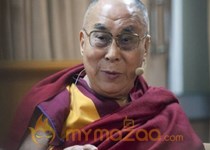The Tibetan spiritual leader said recent elections in Bihar state - which the BJP lost - showed a "majority of Hindus believed in religious harmony".
He was answering a question on "intolerance" in India - an issue that has seen filmmakers, writers and actors return national awards.
The BJP has said the Dalai Lama's remarks should not be "misinterpreted".
The Dalai Lama did not name any political party, but his remarks are being seen as a veiled attack on the government.
The Dalai Lama fled to India in 1959 after Chinese troops crushed an attempted uprising in Tibet. Since then, he has been living in exile in India.
In recent months, Prime Minister Narendra Modi's BJP government has come under pressure to act after outrage over the murders of rationalists MM Kalburgi and Govind Pansare, as well as the lynching of a Muslim man over suspicions he consumed beef.
More than 50 historians have returned national and state awards, joining almost 40 writers who have done the same to protest at what they refer to as growing intolerance in India.
Scientists and filmmakers have also joined the protest, while some people in the business community have expressed concerns.
A number of writers, including Salman Rushdie, also wrote to UK Prime minister David Cameron, telling him to ask Mr Modi to act against intolerance.
The Janata Dal United party, which was a part of the "Grand Alliance" that won the Bihar elections, said that the Dalai Lama's statement was an attack on "extremist elements" in the country.
"The statement made by him has given a strong and befitting reply to the extremist groups in India. The results of the Bihar polls show that forces of tolerance are not only active but are in a majority," a party spokesman told the Press Trust of India news agency.
The BJP, however, has warned against "misinterpretation" of the Dalai Lama's remarks, and said that they were no cause of concern for the party.







